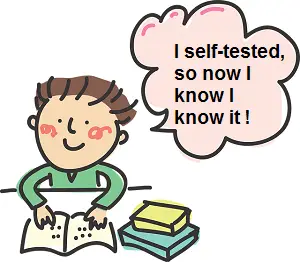- Home
- Better Memory
- Illusions of Competence
Study Trap: "Illusions of Competence," Or When You Actually Don't Know What You Think You Know
Many students find out during an exam that they actually don't know the material, even though they believed they did when they were studying it. This is a study trap called "illusions of competence." It is the cause of many bad grades.
But it doesn't have to happen to you! On the page below I explain how to recognize this study trap during your own studying. And I give you the secret of how to find out whether you actually do know the material.
You may have fallen into this trap yourself. A sure sign is when you don't know the answers during the test, even though the night before you were sure you knew the material.
As I'll explain, there is a way to avoid the illusions of competence trap and greatly improve your learning. This will save you time when studying, and you'll have more confidence that you've learned your schoolwork or the material for your job thoroughly.
The Many Ways You Fool Yourself at Study Time
Illusions of competence describes a mental situation where you think you've mastered a set of material but you really haven't. That's why it's an illusion. You've fooled yourself into believing you know something you don't.

The illusion begins at a particular time during study. Watch out for this: You may be fooling yourself whenever the answer is right in front of you.
KEY CONCEPT: To verify you actually know the material, not falsely believe you know it, you must repeatedly self-test your knowledge of the different sections, topics, definitions, formulas, etc. as you study.
To self-test means attempting to recall the information, from memory only, without looking at the paper or screen. More on how to do this below.
Here are some of the most common ways students fall into the illusion of competence trap:
Words in a Book. While reading the chapter, you find yourself nodding your head in understanding. The material is right there in front of you.
It makes sense, so you'll remember it, right?
"Of course I know this. I see it right there on the page."
NO! SEEING THE INFORMATION IN FRONT OF YOU DOES NOT MEAN YOU KNOW IT.
Math Solution Is Shown. In math, you see a solved equation in the textbook. The steps are shown, and the answer is right there in front of you.
"Of course, I see it right there on the page. It makes sense. So I'm sure I can solve math problems like this."
Again, NO! SEEING THE SOLUTION IN FRONT OF YOU DOES NOT MEAN YOU KNOW IT.
Highlighting or Underlining. You've used fluorescent markers to highlight most of the text in yellow, orange, green, and other bright colors.
"My hands have moved across the book. Look how active I am during studying! I've highlighted or underlined all the important information. Of course I know it."
NO! JUST BECAUSE YOU HIGHLIGHTED OR UNDERLINED IT DOES NOT MEAN YOU KNOW IT.
Browser is Open on Google, Wikipedia, etc. You've googled the information and displayed it on your computer screen. It's right there in front of you.
"I see the answers on the screen. They make sense. I feel like I know the material."
NO! JUST BECAUSE YOU SEE IT ON YOUR COMPUTER SCREEN DOES NOT MEAN YOU KNOW IT.
So Much Time Studying. You've stared at the material for a very long time.
"I've sat with this information for hours and hours. I've re-read it many times. Obviously I know it."
NO! JUST BECAUSE YOU'VE SPENT LOTS OF TIME WITH THE MATERIAL DOES NOT MEAN YOU KNOW IT.
Do you see the pattern here? The information is in front of you, EXTERNAL to you. It's not in your brain. But you think it is!
Self-Testing: How to Know Whether You Actually Know the Material
In each case above, the information is still outside your mind. Seeing it in front of you, your brain falsely believes the material has been internalized and learned.

Self-Test to Prepare for the Test
But you need to get the material solidly in your memory, without the crutch of having an external source right there. After all, you won't have the computer or textbook available during the exam.
In the Coursera course "Learning How to Learn," learning expert Dr. Barbara Oakley explains it this way (I'm paraphrasing):
"You must have the information persistent in your memory to do well on tests and think creatively with it."
In other words, seeing the information on the paper or the screen may give you the sense you understand it, have memorized it, and can work with it creatively - but you may be fooling yourself.
To truly verify you actually learned the material, you must add one more step: Self-Testing.
Self-testing (sometimes called Mini-Testing) is simple to do, but students often resist this step during studying. They neglect it because it's a little extra work.
But self-testing can make the difference between falling into the "illusions of competence" trap (a bad thing) and actually learning the material (your goal).
And a wonderful side benefit is that reciting the material in this way on its own deepens your understanding and long-term retention of the information, quite apart from merely confirming that you actually know it.
How to Self-Test
Self-testing during study is not complicated. It is simply this:
Pause every few minutes and close the book, cover your notes, or look away from the computer.
Try to recall the facts you just read, from memory alone. Or if it's math, try to solve a problem on paper without looking at the book.
If, during step 2, you make mistakes or fail to recall some of the information, be glad! That means you've uncovered an illusion of competence that would have cost you on the test.

The best part is now you can correct it. You can repair your thinking.
Revisit the material and review it again more closely. Even say it out loud if it helps you remember.
Then self-test again. Repeat this process throughout your study session, and during every study session.
Drawing a blank on an exam when you thought you knew the material is a horrible feeling. Believe me, I've been there.
But many times when this happens, it is not because you're not smart or have a poor memory. It's due to the fact that you've fooled yourself into thinking you knew the material, when you really didn't.
So my best piece of advice, and this is one of the secret pillars to success when studying, is SELF-TEST, SELF-TEST, CONTINUOUSLY SELF-TEST as you study.
It is so worth it! You'll have confidence in your learning, and will likely get better grades on exams.
[+] References for Illusions of Competence
Published: 02/14/2017
Last Updated: 06/11/2020

Newest / Popular
Multiplayer
Board Games
Card & Tile
Concentration
Math / Memory
Puzzles A-M
Puzzles N-Z
Time Mgmt
Word Games
- Retro Flash -
Also:
Bubble Pop
• Solitaire
• Tetris
Checkers
• Mahjong Tiles
•Typing
No sign-up or log-in needed. Just go to a game page and start playing! ![]()
Free Printable Puzzles:
Sudoku • Crosswords • Word Search







